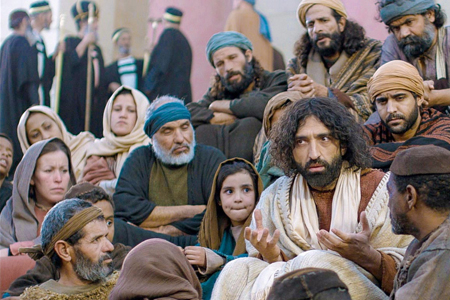Jesus said to the crowd:
‘I am the living bread which has come down from heaven.
Anyone who eats this bread will live forever; and the bread that I shall give is my flesh, for the life of the world.’
Then the Jews started arguing with one another: ‘How can this man give us his flesh to eat?’ they said. Jesus replied:
‘I tell you most solemnly, if you do not eat the flesh of the Son of Man and drink his blood, you will not have life in you.
Anyone who does eat my flesh and drink my blood has eternal life, and I shall raise him up on the last day.
For my flesh is real food and my blood is real drink.
He who eats my flesh and drinks my blood lives in me and I live in him.
As I who am sent by the living Father, myself draw life from the Father,
so whoever eats me will draw life from me.
This is the bread that comes down from heaven; not like the bread our ancestors ate; they are dead,
but anyone who eats this bread will live forever.’ (John 6:51-58)
Reflection - Communion with Jesus and one another
The first reading this weekend tells how Wisdom has built a house and invited the foolish (those who are not yet wise) to feast on the food of her teaching. Those who eat the bread and drink the wine of Wisdom perceive God’s saving action and understand the life to which they are called as God’s own people.
This first reading provides us with an introduction to listening to the words of the Gospel. Jesus is the living wisdom of God. Like Wisdom in the first reading, Jesus also invites us to feed on him so that we, too, may become wise in the ways of God, perceive God’s saving action in him, become the people of God and have life, not only now, but for ever.
In the Gospel, the dialogue between Jesus and the people continues. This time they are arguing about how Jesus could possibly give them his flesh to eat. Jesus insists that if they don’t eat it they will not have life in them and they will not have eternal life.
Underlining the message by talking about his flesh being real food and his blood being real drink immediately connects this teaching of Jesus to the Eucharistic celebration. Some of these verses may well have been used by the Christians in John’s time during their liturgy. But this reading is not only about the Eucharistic celebration, but also about what that celebration symbolises – the very life of God made present and visible in the person of Jesus and received in the sacramental signs of Bread and Wine. It is a celebration of being in communion with Jesus and the Father. Following the teaching of Jesus, it is also a celebration of being in communion with one another.
Intimate relationship (being in communion) with Jesus the ‘bread of life’, is the way in which Jesus feeds his people with his very self - his own flesh and blood – everything that he is. Food sustains and supports life and growth. To eat Jesus is to be caught up in the communion of life he shares with the Father and to feed on the very life of God. It is how we are sustained in and grow in our relationship with God. Eternal life is part of sharing the life of God.
You can download and print our prayers and reflections for this Sunday.
pdf
Celebrating At Home 20th Sunday of Ordinary Time [PDF]
default
Celebrating At Home 20th Sunday of Ordinary Time [ePub]















